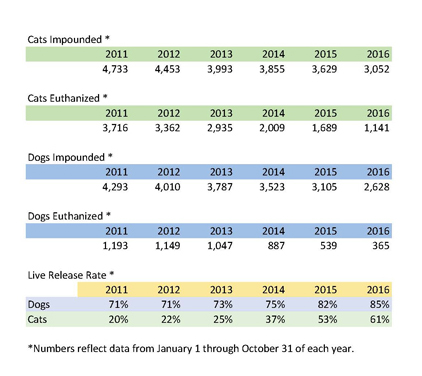
Photo by V. I. Levi
On October 1, 2015, the Mandatory Spay Neuter (MSN) and Pet Shop ordinances went into effect in Long Beach. MSN made it obligatory for most dogs over 6 months old who live within the incorporated boundaries of Long Beach to be altered. The Pet Shop Ordinance (Subsection 6.16.062), which conditionally disallows the sale of animals within city limits, was also passed during that meeting, with the goals of encouraging adoption and discouraging backyard breeding sales and bringing in pets, dogs in particular, from puppy mills by the literal truckload.
The ordinances passed 7–1, with District 8 Councilmember Al Austin casting the single no, after a couple of contentious meetings that pitted residents who wanted to leave their pets intact for a number of reasons, breeding being the most prevalent, and those who saw the measure as a way to further stem shelter euthanasia that results from unwanted animals, particularly litters, being abandoned, harmed or turned in to the shelter with the erroneous belief that they’d all find homes.
Cats were not included in this ordinance because it’s been against the law since 2010 to own an unaltered cat over 4 months old within city limits unless a licensed veterinarian has certified in detail that the animal has a medical condition or is incapable of breeding. The exemption also applies to dogs in the 2016 ordinance.
Full Text and Explanation of Ordinance
The full text of the ordinance, Subsection 6.16.085 in the Long Beach Municipal Code, can be read here. Salient points are as follows:
- Cats over 4 months old and dogs over 6 months old must be spayed or neutered.
- Adoptable cats and dogs in public and private shelters will be spayed or neutered before going to their new home.
- Exceptions to the mandate:
- The animal has been described by a licensed vet as either incapable of breeding or has a medical condition that could result in death or disability. The vet must provide a certification describing both the condition and the length of time of unsuitability. For an exemption beyond that period, a new certification must be obtained.
- Dogs used by law enforcement, in search-and-rescue, herding and as service animals. In each instance, appropriate certification must be provided to ACS for exemption. The “diploma mill” papers that can be purchased online will not qualify a pet as a service animal.
- A dog whose breed is approved by and registered with a national or international breed registry or association such as the American Kennel Club (AKC). Minimum requirements include identification of the breed, dog’s date of birth, names of registered sire and dam, the name of the breeder and recordkeeping relating to breeding, and transfer of ownership. All of this must be presented to ACS.
- The mandate was amended to read that a dog with a valid intact license may keep the status as long as the license doesn’t expire.
Faucet ‘Stem’
The mandate and its exemptions, including the one for licensed breeders, are pretty much equivalent across the board in U.S. cities that have adopted mandatory spay/neuter. The licensed-breeder exemption, along with the amendment permitting the grandfathering of intact licenses, seemed to be throwing a bone, so to speak, to a relative minority of dog owners represented at the March 2015 meetings in order to get the ordinance passed for the benefit of the majority of pets. By contrast, no one spoke opposing the Pet Shop Ordinance.
The creation of both ordinances was spearheaded by Judy Crumpton, a Long Beach humane educator and former co-writer of The Scratching Post (then the Pet Post) and drawn up by then-council member Suja Lowenthal (Second District) and current members Suzie Price (Third District) and Stacy Mungo (Fifth District). MSN also was created to promote pet health by preventing some of the cancers and other conditions that pets are subject to and to decrease bites from unneutered male dogs, which are more aggressive than their altered counterparts.
But the main reason was to help stem the flow of unwanted dogs and cats that enter the city’s shelter because of the owner’s negligence, abandonment of pets to the street, and the desire to breed their pet, mainly dogs, and sell them on the street or online. This is known as backyard breeding and is different from how licensed breeders breed and sell the animals.
As of now, the ordinance seems to be helping in that respect. Long Beach Animal Care Services (ACS) Manager Ted Stevens indicated a continuous decline in euthanasia and shelter impounds (see graphic). At this time last year, in fact, these numbers were 15 percent higher than the 2016 monthly count—“a record in itself,” Stevens said. He cites public education as part of the success, the information coming in the form of explaining to pet owners the reason for the ordinance and to let them know about resources for the procedures, particularly if they cannot afford them. Residents are then given the opportunity to fix their pet before being given a citation and paying a fine that can amount to hundreds of dollars.

Statistics courtesy of ACS
“It’s still relatively new, but we have been getting a lot of people getting vouchers and getting their dogs altered after we educate them,” Stevens said.
Effort to educate is bolstered by social media on both the shelter’s part and that of rescues, animal-welfare groups, community cat trappers and particularly by Fix Long Beach’s (FLB) Facebook page. Volunteers from the animal community have been proactive in educating residents about alternatives to surrendering pets to a shelter, in particular the Animal Resource Team. Vouchers that lower the cost of procedures at selected veterinary clinics, made possible by Friends of Long Beach Animals’ (FOLBA) SNIP program, are available through ACS. [Disclosure: The writer is a longtime FOLBA member.]
“When an ACS voucher is given out, it comes with education about the law, which the voucher user sometimes shares with friends, family and so on,” Crumpton said. “This has encouraged others to also spay or neuter their companion- animal family member.” Crumpton helps to endow the voucher program through community fund-raising—she raised $6,000 through several events—and said that she’s gratified by the response to the vouchers and the chain of communication that informs residents of their availability.
Fix Long Beach, a completely volunteer-run organization that was founded by Long Beach animal advocate Claudia Hoffman, brings spay/neuter mobile clinics to the neighborhoods where they’re needed most and offers free procedures that are essential residents who cannot afford the procedures. [Yet another disclosure: The writer has been an active volunteer in Fix Long Beach for over three years.] In the three and a half years of its existence, Fix Long Beach’s waiting list has become so long that it’s been difficult to accommodate everyone on the clinic trucks, so vouchers for free procedures are made available to people who can’t get an appointment in time or whose dog is too large to fit on the truck. The demand is heartening but also puts a considerable demand on the volunteers’ stamina.

Fix Long Beach volunteers make it easier for Long Beach residents to spay and neuter their pets, through mobile clinics like this one. Photos courtesy of Fix Long Beach.
“Our actions support the cities requirement of mandatory spay and neuter, but of course with that come challenges,” Fix Long Beach board member Diana Kliche said. “Our biggest challenge is funding. It takes around 15 volunteers and thousands of dollars to put on our monthly low-cost clinics. At almost every clinic, animals come to us that require immediate vet care, foster care or new homes. Additionally, because other cities in Los Angeles and Orange counties do not have mandatory spay and neuter laws, we have overflow from those cities. In the end, it all comes down to education, time and money. We try to educate each of our clients, but without the volunteers, time and funding, we cannot continue to do so. That is why the support of the community, other groups and the government is so important. We are very appreciative of the support of everyone in furthering our efforts.”
Community Effort
Even with all the efforts, however, some residents aren’t going for it. Being informed about the existence of the ordinance seems to have no effect.
“Obviously, we still come across those people that flat-out refuse,” Stevens said. “After all warnings and grace periods are gone, we move to citations.”
Citations can run into the hundreds of dollars, but the ordinance’s scofflaws have a catch-me-if-you can attitude. One person walking two intact pugs at a recent event was told about the reasons for the ordinance and was offered a free procedure. She responded that she’d “think about it” and was then heard to ask someone else if there were no-kill shelters, apparently to drop off puppies she couldn’t get rid of.
And it’s impossible to enforce the law 100 percent. Puppies from mothers that are bred and rebred by their owners for the sole purpose of making money and sold for their “bloodline” or as “purebreds” without the official paperwork comprise one reason for the shelter’s dog side filling up. As far as cats go, it’s difficult to locate an unaltered feline until they’re found kicked to the curb—literally—nursing a litter of kittens. Added to this are the discarded puppies, worn-out breeding mothers and the unaltered community cats that far outnumber the people willing and equipped to trap them, and fix them, and find fosters or homes for the kittens.
But nothing’s built in a hot minute. In a little over a year, the promising drop in euthanasia and the lowered intake rates are encouraging. Every animal advocate in Long Beach continues to work hard, but everyone’s understanding and cooperation, a lot of educating, and a good deal of enforcement are necessary. Long Beach isn’t a “no-kill city” yet and won’t be until everyone’s onboard.
“We’re hoping that because of our action, Long Beach and the surrounding cities will one day in the near future have a no-kill shelter,” Kliche said.
And if it takes an ordinance to help make that happen, so be it.


Change occurs slowly. Very often a legal change might take place but the cultural shift required to really accept its spirit lingers in the wings for decades.
~ Sara Sheridan, author

